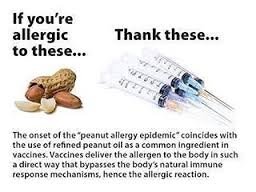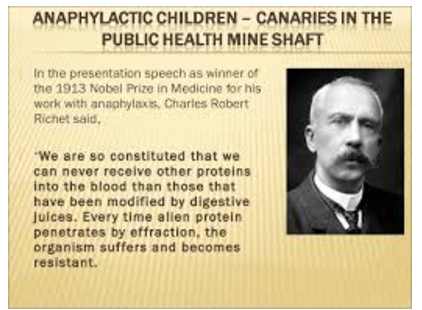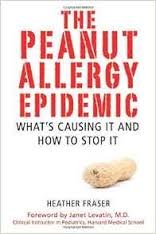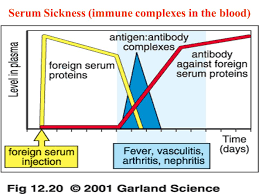The Epidemic Rise in FOOD ALLERGIES -- And How They Knew 100 Years ago that Vaccination Could Cause This


Over 100 years ago, Nobel Laureate Charles Richet proved that injecting a protein into humans or animals could cause allergic reactions or anaphylaxis.
... yet vaccination injects food proteins into our bodies anyways.
And the result of ignoring this wisdom?
An epidemic of food allergies coinciding with the massive increase in the vaccine schedule!

Many vaccines and injections contain food proteins.
MANY STUDIES SINCE 1940 HAVE DEMONSTRATED THAT FOOD PROTEINS IN VACCINES CAUSE SENSITIZATION IN HUMANS.
Allergens in vaccines are not fully disclosed.
Above Quoted from 2015 Journal of Developing Drugs
Evidence that Food Proteins in Vaccines Cause the Development of Food Allergies and Its Implications for Vaccine Policy by Vinu Arumugham
READ THIS FULL PUBLISHED CASE REPORT @ omicsgroup.org by clicking HERE.

So what's worse? Getting a once normal childhood illness like chickenpox or measles
... or getting a life-threatening peanut allergy where you risk death everytime you eat out?
When I was a child, those illnesses were normal and people were not frightened of them
... but today the new normal is carrying around an expensive Epi-Pen to try to stop anaphylaxis from ingesting the wrong food, plus banning all peanut products from schools.

Which do you think takes more lives in developed countries ... measles or death from allergic anaphylaxis?
Which is easier to treat? Why are we not told about the trade-off?
Heather Fraser has written about the role of vaccines in causing peanut allergies in her book, The Peanut Allergy Epidemic: What’s Causing It and How to Stop It. 
Heather Fraser noticed that mass allergic phenomena first emerged at the close of the nineteenth century when mass vaccination began. It used to be called “serum sickness.”

In 1964, it was written in the New York Times that "Adjuvant 65" had just been patented that contained Peanut Oil, and was going to be used in the Influenza Vaccine.
Peanut oil is a common trade secret ingredient in vaccine adjuvants. Because the ingredients are "Trade Secrets" you will not see those ingredients listed on the Vaccine Package Insert.

Vaccines and injections are the main cause of food allergies.
The first allergy in children is casein (milk) allergy due to the casein and aluminum adjuvant in the DTaP – Diphtheria, tetanus and pertussis (whooping cough) shot which is often given at 2-3 months of age. Since all babies are fed milk in some form immediately, this is the first allergy to be recognized.
The next allergy to usually show up at about 3 months of age is soy allergy due to the soy peptone broth and aluminum adjuvant in the Pneumococcal Conjugate vaccine given at approximately 2 months of age. Since soy formula is frequently fed to infants, this allergy also shows up early.
Peanut and nut allergies have shown up as early as 6 months of age in children. Peanut oil is a common trade secret ingredient in vaccine adjuvants.
Some manufacturers rely more predominantly on other oils in the vaccines - sesame oil in the vaccines used in Israel and parts of Europe or fish oil which is used in the Scandinavian countries.
At 6 months of age, children can have had as many as 16 vaccinations several of which can contain mixed oils in the vaccine adjuvant. Many different food oils can be used in the vaccine adjuvant and even more foods used in the culture medium.
These ingredients DO NOT HAVE TO APPEAR ON THE PACKAGE INSERT because they are considered "inactive" and are a protected trade secret. Most physicians do not know that all of the ingredients do not appear on the package insert.
VACCINES ARE NOT IDENTICAL FROM BATCH TO BATCH OR EVEN FROM DOSE TO DOSE.
THE FOOD PROTEIN REMAINING FROM THE OILS IN THE ADJUVANT OR THE CULTURE MEDIUM VARIES WHICH IS WHY ALL THE CHILDREN GETTING VACCINATED FROM A PARTICULAR BATCH OF VACCINE MAY NOT ALL GET THE SAME FOOD ALLERGIES.
Above QUOTED from A Study of the Association of Vaccinations and Injections with Food Allergies Barbara Feick Gregory
For a Personal Story of Vaccine Injury, Please Watch This 2-minute Youtube:
Rubella Vaccine Created Allergies & Gut Issues In Healthy 14-Year-Old Girl
More Info Here: Allergens In Vaccines


I'm just going to take a potshot here, if you don't mind:
Where did you get the idea that that was a likely outcome?
What do you think of this article that calls the "peanut allergy epidemic" into question:
https://www.ncbi.nlm.nih.gov/pmc/articles/PMC1557974/
This question feels a tad disingenuous, because measles is very uncommon in western countries, precisely because of vaccines. Again, I'm not trying to refute the idea that food allergies are connected to vaccines (I've done no research on that question), I'm just trying to help you and others think more logically.
Okay ... I just read that abstract you linked to ... thank you for supplying that!
You seem to be right that I over-exaggerated the risk of death related to food allergies.
Your article says ...
What jumped out at me is the part about the epi-pens (epinephrine). You may have seen in the news lately outrage over how the drug companies raised the price beyond affordability when it only costs less than $1 to produce. What I see is the pharmaceutical companies ONCE AGAIN using fear to SELL A PRODUCT -- first they profit off of your fear of once normal childhood illnesses like measles to see multiple doses and boosters of vaccines .... then when the vaccines give you a food allergy, they profit off an over-stated fear of death from food allergy.
Again, thank-you for that link, I really enjoyed learning something else new... it seems I never stop learning even after researching this for 13 years.
To conclude, no child or adult should have to suffer discomfort or pain their whole life from the simple act of eating normally nutritious food. My son's 12-yr-old friend found out recently he is sensitive to gluten, and he is in a lot of pain when he eats it, but the poor kid hates that he can't join us when we are eating. He eats is often anyways even though he regrets it later, because it's so hard not to take a piece of the birthday cake, etc. It is sad and this poor child is missing a lot of days of school due to stomach distress. I hate seeing him suffer.
Yeah, the fear surrounding food allergies is a very interesting one to me. My brother has worked in emergency medicine for something like 10 years (first in an ambulance, and then in an emergency room in a regional trauma center hospital), and he told me he's never even once seen someone with a life-threatening allergic reaction to food. And yet we all believe that food allergies are common and extremely dangerous.
When I talk about food allergies, I'm including things like gluten sensitivities -- things that you eat and cause you pain or discomfort. Those things seem very common. But maybe "allergy" isn't quite the correct term? I'm going to have to look into this further.
Gluten sensitivity is a remnant of the time when we started using wheat as a source of food. Most of us have evolved to be able to congest gluten while there are still many individuals that haven't. Same goes for cow's milk.
As for cow's milk I have found that raw milk which is non homogenized and unpasteurized doesn't cause problems for most people. When I met my husband he told me he couldn't drink milk and indeed he would get these deep painful zits when he had it, and then I discovered raw milk which he has no problem with. You can make cheese with raw milk and 99% of the casein is digested by the bacteria and my husband can eat raw milk cheese no problem.
I really believe the problem isn't the foods that people used to eat for thousands of years and were healthy for us, but the problem is the way they have either changed the foods to be something they never were in the past ... or because we have damaged our bodies through things like vaccinations and our bodies can't handle it anymore
I did research a while back and found that gluten intolerance is triggered by mercury. A friend's was triggered when she had her mouth full of amalgams removed in Central America. The dentist did a poor job because she felt like she was going out of her mind for a few days afterward. You know, Mad as a Hatter? I gave her a bottle of coriander seed oil (by Activation Products) which detoxifies Mercury and her gluten intolerance improved a lot where now if she accidentally eats gluten it doesn't bother her.
And of course vaccines contain mercury so that's why it would help trigger gluten intolerance. And there is wheat in some vaccines. So both the mercury and the wheat combined in a vaccine would make it a double whammy.
This website links to a bunch of studies that indicate "food allergies" numbers in different countries. I am curious now though what their definition of a "food allergy" is.
http://barbfeick.com/vaccinations/allergy/951-vaccine_allergy.htm
Ok ... from what I just found it seems that these researchers are including "sensitivities" and "hyper-sensitivities" when they talk about allergies ... so things like soy and wheat that would normally never kills someone.
People in developed countries were not dying of measles before mass measles vaccination started here. I'm 48 in Canada and the vaccine wasn't given in Canada yet when I was a kid. I had measles, mumps, rubella and chickenpox. People were not dying of it then. People weren't worried about it when I was a kid. My mom never took me or my 3 sibling to the doctor when we got measles. Yes, measles was common, but the death rate had dropped off to almost zero before the vaccine was introduced. Even today with the Measles "scare" in Disneyland, nobody died. So the fear is really hyped up just to sell a vaccine.
Think about the chickenpox vaccine -- in the USA and Canada where it is on the childhood schedule, the health info tells us that it is a dangerous disease. In countries like England and almost all the world where they don't give that vaccine, the health departments say that it is mild and normal and nothing to worry about.
Fears sells vaccines.
At any rate ... parents should be informed of the risk they trade off for to avoid measles, etc. I'm glad that I had measles for 1 week of my life, rather than having to watch what I eat EVERY DAY of my life -- even if the allergy doesn't kill but only brings discomfort or pain.
Thank-you for your comment and participating in discussion!
Maybe the CDC website isn't the best resource, but it at least partially disagrees with you:
Anyway, thanks for your reply. I think you can guess which side of the vaccination debate I'm on, but I'm interested in learning what more there is to learn.
I think you and cc are on the same side!
People might think the "sides" are anti or pro vaccine but I disagree: you have to want to impose your will on other people for us to need sides like anti or pro vaccine. Most people don't want that or can easily give that up, it is illegal and one has to use force or aggression to enforce it.
I think the much more effective way to pick "sides" is this: If you want to profit on vaccines at the expense of health then you might be on a side.
In other words, I really like your professional replies. I'm really happy to hear your perspective on the post. I think you and cc and myself are all on the same side. Yes the fraud in the CDC is a very big concern.
I'm going to give you some stats to put those deaths into perspective, and then link to the source ...
http://vaxtruth.org/2012/01/measles-perspective/
I will have to do a post about just measles soon. Hopefully we can discuss this more when I do that post.
Do you have a report about the 10 or so CDC scientists that signed a statement about the misrepresentation of data based on corporate interests? (for @biophil)
Thanks for mentioning that jamesc ... Here's a link to my article on the dozen brand new whistleblowers at the CDC ...
https://steemit.com/vaccines/@canadian-coconut/a-dozen-brand-new-whistleblowers-within-the-cdc-s-p-i-d-e-r-bites-the-centers-for-disease-control
You are open to learn, that's all that matters. And you are polite, so thank-you.
I already posted how the number of measles deaths is a very, very small percentage when you look at the whole population.
If you want to take the time to go back and look at some of my older posts, you will see how I discuss the numbers of injuries and deaths from the vaccines themselves.
It's all about risk vs. benefit. From my studies, the risks of vaccines far outweigh the benefits. At one time, I went through each illness/disease and each vaccine, because it is possible that one or two vaccines could have a higher benefit than risk analysis. My conclusion was that none of vaccines had a higher benefit than the risk ratio. But each person must do their own research. I can't tell anyone what to do. Everything in life comes with some risk.
My friend learned in their environmental science class that vaccines do indeed cause allergies. It was from a university course.
I coached a couple kids on my son's football team who had the peanut allergy. The parents were suspect of vaccines because the symptoms arose just after these were administered. They proceeded to home school their kids from then on out due to school board regulation. Interesting to see the correlation here.
Thanks for sharing yet another parent's account of how vaccines injured their children.
That's very interesting. Just shows that there are some good scientists and professors who are willing to mention the shortcomings of vaccines. If it had been medical school that would probably not have happened as they usually only say "vaccines save lives" but never any downside other than a sore arm or fever.
I learn a lot. Maybe I just didn't remembered those info but either way thank you! I very much appreciated reading those facts.
Thanks again teamsteem!
This is fascinating. I must have been given every vaccine in the book when I was a kid, then. I've grown into more and more allergies/sensitivities each year: gluten, then dairy/animal products/eggs, peanuts, and soy; later sesame seeds, onions, and peas. Now it seems I might be allergic to high-nickel containing foods.
I am glad you enjoyed this. Sorry to hear that you have so many allergies
Great information! Resteemed
Thanks so much! I'm glad you liked it.
This post has been ranked within the top 80 most undervalued posts in the first half of Dec 02. We estimate that this post is undervalued by $8.54 as compared to a scenario in which every voter had an equal say.
See the full rankings and details in The Daily Tribune: Dec 02 - Part I. You can also read about some of our methodology, data analysis and technical details in our initial post.
If you are the author and would prefer not to receive these comments, simply reply "Stop" to this comment.
Thanks again screenname!
The food allergy thing I've only seen in America. I'm sure there are people in other places with allergies, but it's very few of them. In the country I was raised, for example, I have never met a single person with peanut allergy. If people have any allergies it's usually to a specific chemical, found on lotions or stuff like that, which they realize shortly after they start using it and once they stop it goes away, few people are found to be allergic to certain antibiotics. But food? I've only ever seen that in TV or America.
What country are you from?
Something I found very interesting is that in Israel, although people eat a lot of peanuts, there are almost no peanut allergies. What is common in Israel is Sesame allergies. As it turns out, Israel uses Sesame Seed Oil in their vaccines rather than peanut oil.
If the country producing the vaccine is using different food/oils in their vaccines, then people would only notice an allergy to those foods, if and when they consume those foods.
I am in Canada, and peanut allergies are very common here as well as the USA.
I don't know what they use as a vehicle for vaccines in Dominican Republic, but they are not as anal about them. I think I've received 2 or 3 vaccines in total throughout my life, eventhough many times they are offered by the Gov at no cost. As a kid I think you get the one for Polio, but I don't know of another that is mandatory. When I was in highschool I was forced to get the Rubeola one. I think it's been 3 of them, but I don't remember the other. The point is vaccines aren't a big deal here, people pretty much go on the remedies grandma does with fruit peels and roots. Eventhough some call it the third world allergies of all kinds are very rare. Anyone can have an allergic reaction, but I've never met anyone outside the US with a food allergy.
Well that explains it then. Kids in the USA are BOMBARDED with vaccines starting at the first day of life. Canada has less but still too many. Less vaccines equals less likelihood of food allergies. When I was a child we got about as many as you did and food allergies were not an issue in my childhood.
Happens in Australia too, schools my kids go to, you aren't allowed to bring any food with nuts, and sharing food is strictly forbidden.
And yep, mandatory vaccination schemes for children in place. Opting out results in the withdrawal of tax breaks extended to families.
This post has been linked to from another place on Steem.
Learn more about and upvote to support linkback bot v0.5. Flag this comment if you don't want the bot to continue posting linkbacks for your posts.
Built by @ontofractal